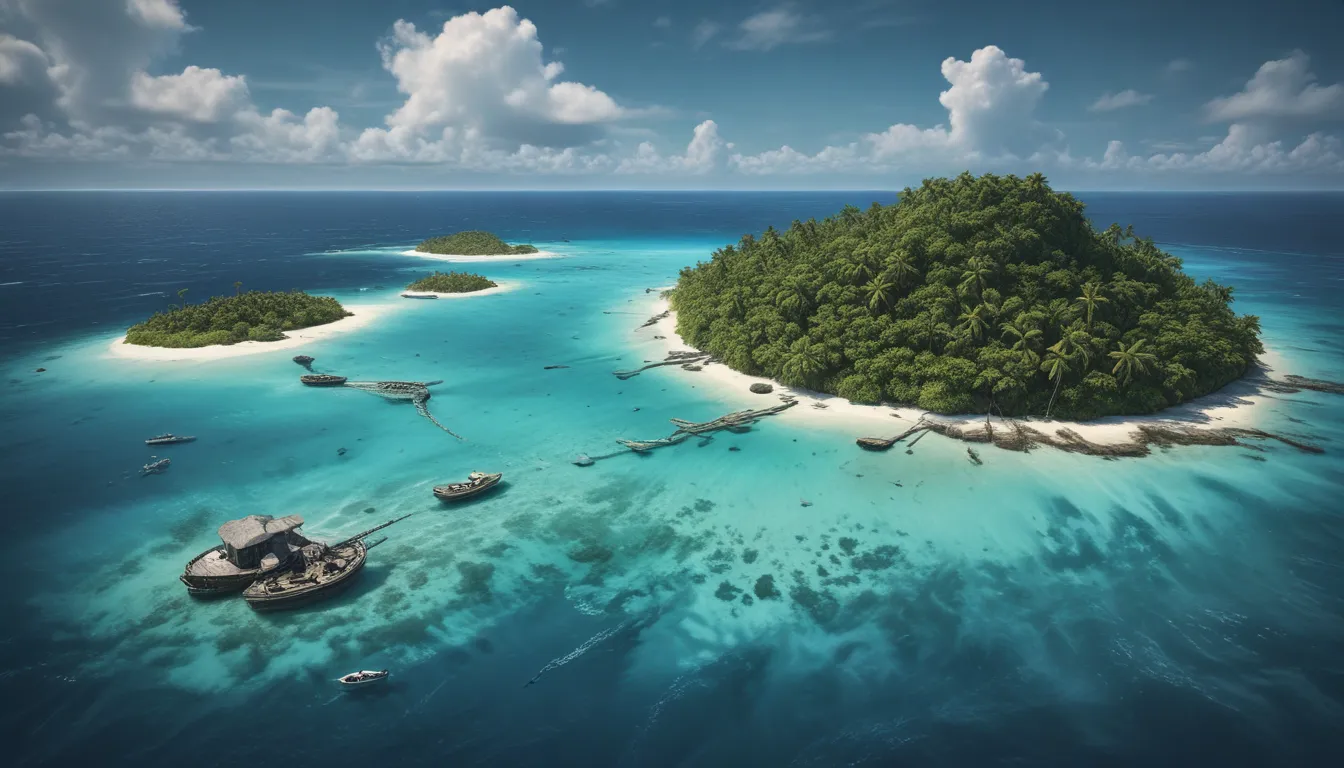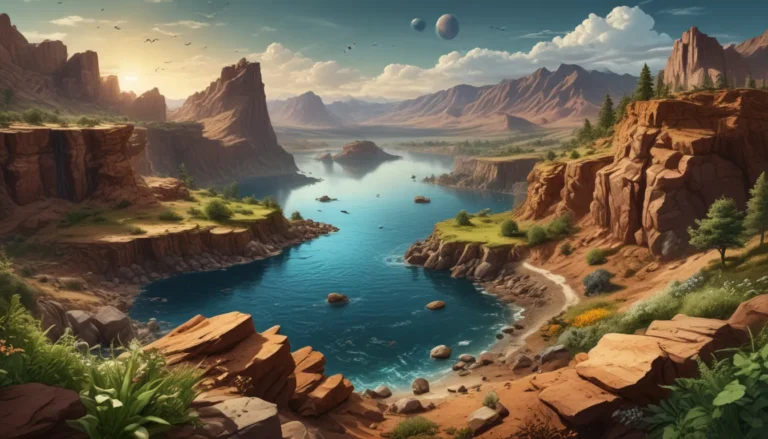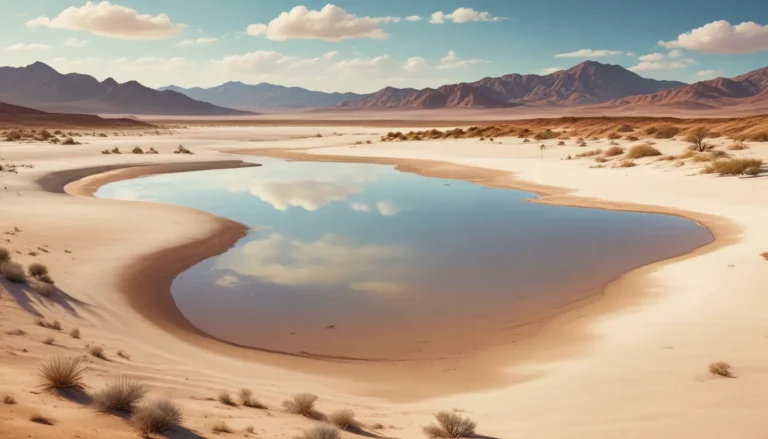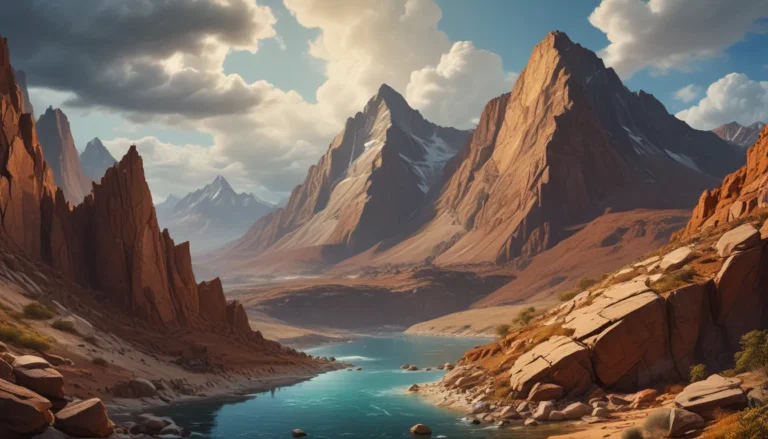A Note About Images: The images used in our articles are for illustration purposes only and may not exactly match the content. They are meant to engage readers, but the text should be relied upon for accurate information.
Atolls, the ring-shaped coral islands that dot the oceans, have long captured the imagination of explorers and nature lovers. These unique geological formations offer a glimpse into a world filled with beauty and wonder. In this article, we will delve into eight captivating facts about atolls that will leave you fascinated and eager to discover more. Whether you are a seasoned diver, a budding marine biologist, or simply someone curious about the natural world, get ready to explore the enchanting realm of atolls and uncover the secrets they hold.
The Allure of Atolls: Key Takeaways
- Atolls are stunning ring-shaped coral formations that have formed over thousands of years, providing habitats for diverse marine life.
- These delicate ecosystems are sensitive to environmental changes, highlighting the importance of preservation efforts to safeguard their beauty.
- Atolls offer a unique opportunity for travelers to immerse themselves in nature and experience the wonders of the underwater world first-hand, making them a popular choice for eco-tourism.
- Recognizing their historical significance, atolls are being preserved through conservation efforts to ensure their longevity and protect their valuable ecosystems for future generations to enjoy.
The Formation of Atolls
Atolls are ring-shaped coral reefs that encircle lagoons, created through a process known as subsidence. Over thousands of years, volcanic islands sink beneath the sea, allowing coral reefs to build upon their submerged rims, eventually forming the iconic ring shape that characterizes atolls.
Atolls Are Home to Diverse Marine Life
The vibrant coral reefs found in atolls provide a sanctuary for a wide array of marine species. From schools of colorful fish to graceful sea turtles, these ecosystems teem with life, making them a magnet for snorkelers and divers seeking underwater adventures and close encounters with marine wildlife.
Embracing the Unique Geographical Features of Atolls
Located primarily in tropical regions like the Maldives, Seychelles, and the Marshall Islands, atolls boast breathtaking beauty and picturesque landscapes that captivate visitors from around the globe. Their ring-shaped formations and crystal-clear waters make them ideal destinations for nature lovers and adventure seekers.
Sensitivity of Atoll Ecosystems
Due to the delicate balance of marine life within atolls, these ecosystems are highly sensitive to environmental changes. Rising sea levels, pollution, and coral bleaching present significant threats to the health and stability of atoll ecosystems, emphasizing the need for conservation efforts to protect these fragile habitats.
Accessibility for Every Budget
While some atolls are home to luxury resorts and exclusive private islands, there are also budget-friendly options available for travelers seeking to explore these stunning locales without exceeding their financial limits. From eco-conscious accommodations to affordable tour packages, there are options to suit every budget.
Atolls as Popular Tourist Destinations
Atolls attract visitors from all corners of the globe, drawn by the promise of pristine beaches, clear waters, and a peaceful retreat from the daily hustle and bustle. Offering a unique opportunity to reconnect with nature and witness the beauty of the underwater world, atolls provide an unparalleled experience for those seeking tranquility and natural splendor.
Unveiling the Historical Significance of Atolls
Throughout history, atolls have played pivotal roles as strategic military bases and settings for major historical events. These iconic formations symbolize the intricate connection between land, sea, and human civilization, underscoring their importance as both natural wonders and historical landmarks.
Conservation Efforts to Protect Atolls
Recognizing the fragility of atoll ecosystems, conservation organizations and governments are joining forces to safeguard these precious natural wonders. From reef restoration projects to sustainable tourism practices and educational initiatives, efforts are underway to preserve and protect atolls for future generations.
In Conclusion
In conclusion, atolls stand as captivating natural marvels that offer a glimpse into the intricate beauty of our planet. From their formation on submerged volcanoes to their vital role in sustaining marine life, atolls embody the complexity and splendor of the natural world. Whether you are an enthusiast of nature, a lover of geography, or simply someone intrigued by the wonders of our environment, exploring the fascinating facts about atolls can be an enriching and enlightening experience. The next time you find yourself near a tropical paradise or admiring photos of pristine beaches, take a moment to marvel at the remarkable story behind these enchanting atolls—they are not just picturesque destinations but wonders of nature deserving of admiration and protection.
FAQs about Atolls
-
What is an atoll?
An atoll is a ring-shaped coral reef surrounding a lagoon, typically formed on submerged volcanoes that have eroded over time. -
Where can atolls be found?
Atolls are predominantly located in tropical and subtropical regions, such as the Maldives, the South Pacific, and the Marshall Islands. -
How are atolls formed?
Atolls form through the reef-building process, where coral polyps develop their exoskeletons on remnants of ancient volcanic islands submerged in the sea. -
Why are atolls significant?
Atolls play a crucial role in protecting coastal areas from erosion by acting as natural barriers against waves and tides, while also providing habitats for a diverse range of marine organisms. -
Can atolls be visited and explored?
Yes, many atolls are open to tourists, offering opportunities for snorkeling, diving, and experiencing the unique beauty of these coral formations. -
Are atolls threatened by climate change?
Yes, atolls are highly vulnerable to the impacts of climate change, particularly rising sea levels and ocean acidification, which pose significant risks to their delicate ecosystems. -
Can atolls form in non-volcanic regions?
While atolls are commonly associated with volcanic activity, there are instances of atolls forming in non-volcanic regions through processes like subsidence or tectonic activity. -
Are atolls only found in oceans?
Atolls can also be found in large lakes or inland seas, with examples like the Blue Hole in Belize, attracting divers from around the world.
Join us on a journey to uncover the mysteries and marvels of atolls, and discover why these extraordinary places continue to captivate and inspire us with their beauty and significance. Explore, learn, and marvel at the wonders of atolls as we strive to protect and preserve these natural treasures for future generations to cherish and enjoy.






